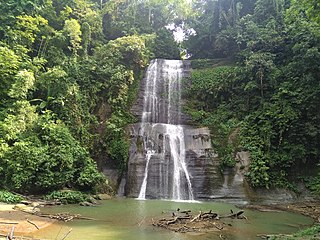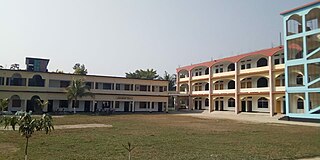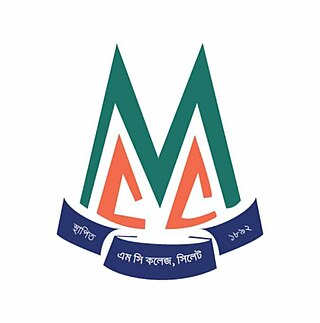
Moulvibazar also spelled Maulvibazar, Moulavibazar, and Maulavibazar, is the southeastern district of Sylhet Division in northeastern Bangladesh, named after the town of Moulvibazar. It is bordered by the Indian states of Tripura and Assam to the south and east, respectively; by the Bangladeshi districts of Habiganj to the west and Sylhet to the north.

Rajbari is a district in central Bangladesh, located in the Dhaka Division. It is a part of the Greater Faridpur subregion of Bengal due to the historical and cultural identities of its inhabitants, with Kushtia border on the west, Rajbari is also the meeting point of two distinctive culture of Bangladesh.

The High Court Division, Supreme Court of Bangladesh popularly known as the 'High Court' is one of the two divisions of the Supreme Court of Bangladesh, the other division being the Appellate Division. It consists of the Chief Justice of Bangladesh and the Judges of the High Court Division.

Nabiganj is an Upazila of Habiganj District in the Division of Sylhet, Bangladesh.

Bishwanath is an upazila of Sylhet District in the Division of Sylhet, Bangladesh.

Murari Chand College was the first college in the Sylhet Division. It was established in 1892, making it the seventh oldest college in Bangladesh. Since then it has played an important role in the educational, cultural, and political spheres of Greater Sylhet.

According to the 2011 census, West Bengal has over 24.6 million Muslims, making up 27% of the state's population. The vast majority of Muslims in West Bengal are ethnic native Bengali Muslims, numbering around over 22 million and comprising 24.1% of the state population. There also exists an Immigrants Urdu-speaking Muslim community numbering 2.6 million, constituting 2.9% of the state population and mostly resides in Urban areas of the state.
The Sylhet Government Pilot High School is one of the oldest schools in Bangladesh as well as in Indian Subcontinent. Founded in 1836, it is situated in the Kalighat area of Sylhet, on the bank of the Surma River.
Syed Murtaza Ali was a Bangladeshi writer. He was the elder brother of writer and linguist Syed Mujtaba Ali. He is noted for his works relating to the histories of Chittagong, Sylhet and Jaintia.
Chowdhury is a title of honour, usually hereditary, originating from the Indian subcontinent. It is an adaption from Sanskrit. During the Mughal rule, it was a title awarded to eminent people, while during British rule, the term was associated with zamindars and social leaders. The common female equivalent was Chowdhurani.

The Greater Sylhet region predominantly included the Sylhet Division in Bangladesh, and Karimganj district in Assam, India. The history of the Sylhet region begins with the existence of expanded commercial centres in the area that is now Sylhet City. Historically known as Srihatta and Shilhatta, it was ruled by the Buddhist and Hindu kingdoms of Harikela and Kamarupa before passing to the control of the Chandra, Sena and Deva dynasties in the early medieval period. After the fall of these Buddhist and Hindu principalities, the region became home to many more independent petty kingdoms such as Jaintia, Gour, Laur, and later Taraf, Pratapgarh, Jagannathpur, Chandrapur and Ita. After the Conquest of Sylhet in the 14th century, the region was absorbed into Shamsuddin Firoz Shah's independent principality based in Lakhnauti, Western Bengal. It was then successively ruled by the Muslim sultanates of Delhi and the Bengal Sultanate before collapsing into Muslim petty kingdoms, mostly ruled by Afghan chieftains, after the fall of the Karrani dynasty in 1576. Described as Bengal's Wild East, the Mughals struggled in defeating the chieftains of Sylhet. After the defeat of Khwaja Usman, their most formidable opponent, the area finally came under Mughal rule in 1612. Sylhet emerged as the Mughals' most significant imperial outpost in the east and its importance remained as such throughout the seventeenth century. After the Mughals, the British Empire ruled the region for over 180 years until the independence of Pakistan and India. There was a complete list of the different amils who governed Sylhet which was recorded in the office of the Qanungoh of Sylhet. However, most complete copies have been lost or destroyed. Dates from letters and seal traces show evidence that the amils were constantly changed. In 1947, when a referendum was held, Sylhet decided to join the Pakistani province of East Bengal. However, when the Radcliffe Line was drawn up, Karimganj district of Barak Valley was given to India by the commission after being pleaded by Abdul Matlib Mazumdar's delegation. Throughout the History of Sylhet, raids and invasions were also common from neighbouring kingdoms as well as tribes such as the Khasis and Kukis.

Farhād Khān, also known as Nizam-e-Zamanah or Nizam-e-Zaman, was a Mughal military strategist who had many positions throughout his life. He was the most well-known Faujdar of Sylhet Sarkar, governing in the late 17th century during the reign of Mughal emperor Aurangzeb. He was renowned for the construction of numerous bridges and places of worship in the region.

The Sareqaum family are a Bengali Muslim family of the Sylhet Division of Bangladesh. They are best known for their centuries-old role as one of the custodian families of the waqf (estate) of Shah Jalal, a 14th-century Islamic preacher whose name is commonly associated with the spread of Islam in the region. The family is the only known family in Bengal to hold the title of Sar-e-Qaum. Some members of the family have migrated to other parts of the world such as to the United Kingdom - which is known to host a large Bangladeshi diaspora.

The Shah Jalal Dargah is the shrine and burial place of the 14th century Muslim saint Shah Jalal, located in Sylhet, Bangladesh. The site, known as a dargah, was originally constructed c. 1500, though many additions and alterations were made to its structures over the following centuries. It became a religious centre in the region, respected across multiple ruling administrations and greatly venerated among Bengalis, with local folklore and legends developing around it. The extensive surrounding compound serves several functions and includes four mosques, a religious school and a public cemetery among others. The Dargah is presently the largest and most visited religious site in Bangladesh.



























